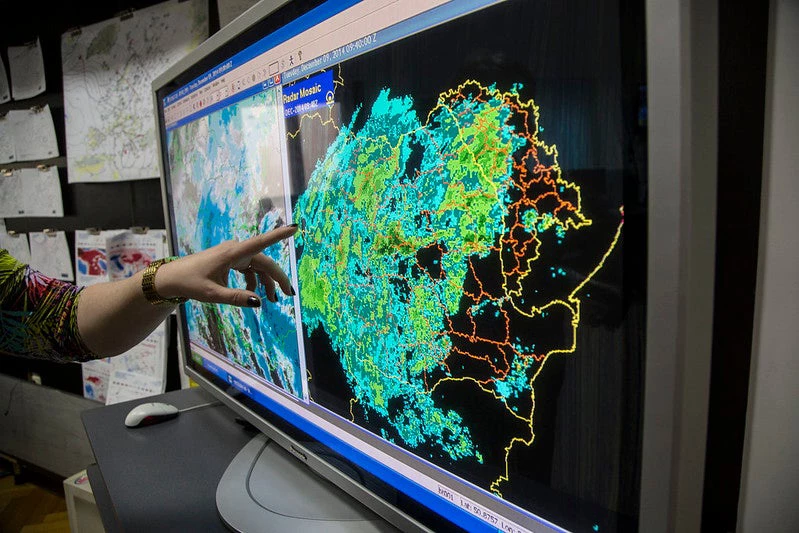 A finger points to a map on a computer screen, labeled Radar Mossaic
A finger points to a map on a computer screen, labeled Radar Mossaic
Climate change is rapidly becoming a central policy challenge across the globe. The strains of governing well in the context of climate change are becoming apparent, and this is creating new challenges in at least three ways.
Managing immediate risks: the disaster management dimension
The years 2020 and 2021 included a record number of climate-related disasters from floods to hurricanes, droughts, and wildfires. The adverse effects of the multiple climate disasters were evident in countries across various regions and income levels. Governments had insufficient warning systems in place, lacked fire-fighting resources, and scrambled to deliver help effectively to people in the aftermath. The magnitude of losses put further strain on fiscal resources already stretched by a pandemic well into its second year. Governments are also having to grapple with delivering post-disaster assistance without undue bureaucracy delays on the one hand but instituting sufficient checks to avoid fraud and corruption on the other. Further, there are questions about regulations: should re-building be permitted in disaster-prone areas? What rules need to be put in place for infrastructure, for utility management, and resilience , for insurance? As developed countries are experiencing more climate-related disasters, they may be incentivized to provide more support beyond immediate disaster relief for strengthening local capacity and resilience in low- and middle-income countries -- to have responsive and prepared systems in place to manage during disasters and in the aftermath.
Building resilience: the broader adaptation dimension
All countries will need to prepare their economies, societies, and ecosystems for a hotter and more volatile climate. This will require particular attention to agriculture, energy systems, water, forestry, land and urban management, and infrastructure in general. Governments will need to increase their policy expertise and implementation capacities across these areas – from supporting the widespread adoption and further development of drought-resistant seeds, sustainable irrigation, increased resilience to grid disruptions and usage spikes in the energy sector, to ensuring that there are sufficient flood plains, forests, and structured urban and peri-urban spaces to withstand increased disaster risks. Public investments need to be expanded to increase resilience of infrastructure, but also better managed to reduce political allocations and waste, including due to corruption – critical for affording the extra costs of resilience and to build fiscal buffers. Centers of government and key ministries such as finance and planning will need increased capacities to coordinate and prioritize, to increase collaboration with local governments who have detailed knowledge of areas at risk, to consult citizens and to be open and accountable.
Reducing emissions fairly: starting and sustaining a just transition
Changing energy production and consumption systems to rapidly reduce emissions will be extremely challenging. Within governments, this will involve moving climate from a still relatively marginal policy area to a central theme . Given the cross-cutting nature of these policies, effective mandates and coordination will be essential. Governments will need to be able to absorb loads of relevant technical, economic and legal advice on how best to reduce energy consumption and emissions by households, expand renewables and ensure reliable power supply, calculating costs and how to spread them across producers and consumers, as well as to anticipate and settle potential legal disputes. Equity and inclusion will pose major challenges – from phasing out fossil fuel subsidies, to enabling the poor to maintain and expand their access to power and affordable transport. Compensation will be necessary, but should not be excessively concentrated on a relatively small but often vocal group of those involved in coal mining or oil production on the one hand, or larger scale and wealthier consumers on the other, but fairly and inclusively benefit those most vulnerable to higher prices or reduced availability of power during the transition. Between countries, fairness and coordination of reducing emissions is another major dimension – with repercussions nationally in terms of capacities to monitor, report, and verify reduced emissions, as well as emerging new rules in international trade. Hence, foreign and economic ministries will need to scale up their ‘climate diplomacy’ capabilities.
Across these policy areas, rapid and massive peer learning will be needed on how to govern in the age of climate change, as this is new territory for everyone. Some developing countries may have things to teach to richer ones – e.g. the Caribbean to others beginning to experience more frequent and larger scale storms and floods. Attention and collaboration need to start now to build effective and accountable governance while taking urgent policy action to adapt and to enter the path to net zero.
Click here to view the World Bank Group's


Join the Conversation